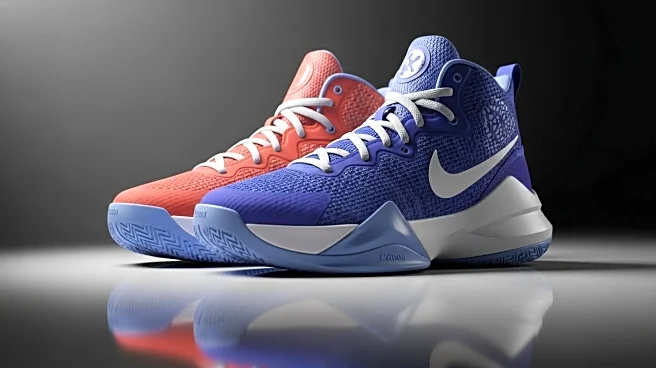What is the story about?
What's Happening?
Nike has signed top college basketball recruits Tyran Stokes and Aaliyah Chavez to multiyear shoe contracts as part of its 2025 NIL class. Stokes, ranked as the No. 1 player in the 2026 recruiting class, and Chavez, the top player in the country, are set to represent Nike in promoting the growth of the women's game. Chavez, who committed to Oklahoma, expressed excitement about partnering with Nike to inspire young girls. Stokes, who has received offers from numerous prestigious schools, recently showcased his talent at the 2025 FIBA U19 Men's World Cup. Nike's inclusion of these athletes highlights its commitment to supporting emerging talent in college basketball.
Why It's Important?
The signing of Stokes and Chavez by Nike underscores the growing influence of NIL (Name, Image, and Likeness) agreements in college sports, providing athletes with opportunities to monetize their personal brands. This development reflects the increasing recognition of women's basketball and the potential for female athletes to drive market growth. Nike's strategic move to secure top recruits aligns with its broader efforts to maintain leadership in the sports apparel industry. The contracts may influence other brands to pursue similar partnerships, impacting the competitive landscape and the financial prospects of college athletes. This trend could reshape the dynamics of college sports, emphasizing the importance of athlete branding and commercial opportunities.
What's Next?
As NIL agreements become more prevalent, stakeholders such as universities, athletic associations, and sports brands may need to adapt to the evolving landscape of college sports. The impact of these contracts on recruitment strategies and athlete development programs could be significant, prompting discussions on the balance between education and commercial interests. Nike's partnerships may inspire other companies to explore innovative ways to engage with young athletes, potentially leading to new marketing strategies and product offerings. The success of Stokes and Chavez in their respective careers could further validate the role of NIL agreements in supporting athlete growth and influence future policy decisions regarding athlete compensation.
Beyond the Headlines
The rise of NIL agreements raises ethical considerations about the commercialization of college sports and the potential impact on athlete welfare. It highlights the need for transparent guidelines to ensure fair compensation and protect athletes from exploitation. The focus on women's basketball through Chavez's contract reflects broader cultural shifts towards gender equality in sports, challenging traditional norms and promoting inclusivity. Long-term, these developments may contribute to a more diverse and equitable sports industry, encouraging greater participation and representation of women in athletics. The success of NIL agreements could also influence public perceptions of college sports, emphasizing the importance of athlete empowerment and financial independence.















